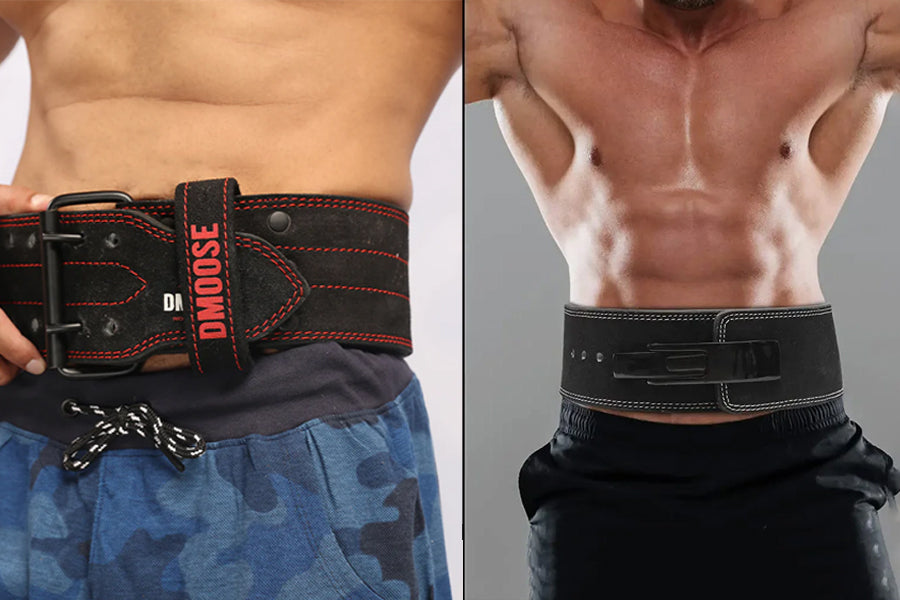Picking the perfect belt to accompany your weightlifting game can be challenging. When deciding between a lever belt and a prong belt, the decision comes down to a few key factors you need to consider.
Firstly, how tight do you like to wear your belt? Secondly, what is your budget? And last but not least, how adjustable would you like it to be? The lever belt might be the way to go if you're all about performance and don't mind spending a little extra.
Although they have fewer options, the lever is easy to use and can be tightened to the highest level to meet your lifting needs. However, a prong belt might be the more practical choice if you're more of a budget-conscious lifter.
Pick a secure belt that fits your budget between the single and the double prong. So which one will it be? Choose wisely and dominate the weight room!
Related Article: Weight Lifting Belt - The Absolute Protection You Need When Lifting Heavy Weights
Difference Between Lever Vs. Prong Belt

Discovering the perfect powerlifting belt can be daunting, especially when choosing between a lever or prong buckle. Don't worry-there's no need to stress. There is a wide variety of lever and prong belts in the market, like 10mm lever belts, 5mm powerlifting belts, 10mm powerlifting belts, neoprene belts, and many more.
While a lever belt may be pricier, it's easy, one-motion securing technique saves you time and effort. On the other hand, the prong belt offers more versatility in adjusting its tightness and comes with either a single or double prong. While both options give solid support during lifts, the choice ultimately depends on your personal preferences and needs. Remember, when it comes to lever lifting belts, they're most popular with powerlifters because they provide more significant support and stiffness.
Ready to buckle up and lift some serious weight? Let's explore the world of weightlifting belts! So, both types of belts are utilized by top athletes, and the ultimate decision boils down to personal preference. Delve into the advantages and disadvantages of each belt in this article to ensure you make a sound choice for your powerlifting journey.
Lever Belt is More Expensive
Choosing between two similar products is often a tough call, and it's easy to assume that the cheaper option is the best bet. If you're debating between a prong and a lever belt, you might be tempted to choose the former because it's typically less expensive.
However, it's essential to consider the long-term investment you're making in your workout gear. You'll buy multiple pairs over a year if you frequently use accessories like gloves, wrist wraps, and knee sleeves.
So, before you automatically choose the cheaper option, think about the value and quality you want to get out of your purchases. If price is your main concern, it may be worth splurging on a more expensive option to ensure durability.
Even if you choose a more affordable belt, the quality is likely comparable, meaning both options should last a similar amount of time. Ultimately, choosing a belt that fits your needs and budget can help you reach your fitness goals safely and effectively.
Prong Belt Gives You More Options

Using a lifting belt properly can make a big difference in your workouts, but it's not just about strapping it on tight. Lifters who want to activate their core before a significant lift might prefer to keep the belt a little looser, and a prong belt can make adjusting the tightness much easier.
On the other hand, a lever belt might feel like one size fits all, with a set tightness that stays the same throughout your workout. If you want to change the tightness between sets or exercises or your gym attire changes, the process becomes more complicated and time-consuming.
Ultimately, your right belt will depend on your preferences and the workout style. Having to unscrew and adjust a lever belt can be a real buzzkill during gym time. With a prong belt, you can adjust the tightness by pulling the strap - no tools are required.
It means you can spend less time fiddling with your gear and more time powering through your workout. If time is a precious commodity, then a prong belt can help you make the most of it.
Lever Belt is Easier to Use
It is time to say goodbye to the hassle of removing your belt between sets with the lever belt-once you have the right fit, this belt is a game-changer. Unlike a prong belt, a lever belt can be tightened more to meet the needs of lifters who prefer a super-tight fit.
With the lever, you can quickly achieve and maintain your desired tightness, so you can focus on your lifts instead of constantly readjusting. And when you're ready to take a breather between sets, you'll love how effortlessly the lever opens with just one motion, leaving you free to reset and prepare for your next rep easily.
Lever Belt Is Easier to Secure

Choosing between a lever belt and a single-prong belt all comes down to ease and security. The beauty of a lever belt is in its simplicity-close the buckle, and you're good to go. On the other hand, a single prong belt relies on just that-one prong, which can wear down over time and leave you less secure.
But have you ever noticed those lifters struggling to get their single-prong belts tight enough? They'll often have to use a squat rack or post to help them out. Talk about an unnecessary hassle!
Of course, a lever belt may seem like the easy way out, but only if the tightness is locked in just right. After all, it's not like you can make quick adjustments on the fly. So, whether you choose the lever or single-prong belt, ensure you find the best fit for your weightlifting needs.
Differences Between Single Vs. Double Prong Belt
Belt up for an exciting ride as we explore the world of single vs. double-prong belts. These two types of belts may look similar at first glance, but crucial differences make each one unique.
Discover why single-prong belts offer more versatility while double-prong belts provide extra security for heavy weights. Unlock the secrets of belt buckle designs and determine which suits your needs best. Let's dive in and explore the fascinating world of belt fastenings!
- Gym-goers often opt for a one-prong belt for its speed and convenience, while a two-prong belt may take a bit longer to adjust before hitting the weights.
- While the double prong may offer additional support and safety, it comes at a higher cost due to using more materials. Don't sacrifice quality for the price; choose the single-prong alternative and enjoy stylish accessories without breaking the bank.
- Investing in a double-prong belt that evenly distributes the pressure between two prongs for added durability is wiser. Remember, a double-prong model is better if you buy a weightlifting belt for long-term use.
Lever Belt Pros & Cons
Pros:
- It provides enhanced security.
- It offers greater flexibility in control.
- It provides an improved user experience.
Cons:
- It can put a dent in your wallet.
- Finding the perfect fit can be a challenge.
Prong Belt Pros & Cons
Pros:
- Embrace endless possibilities with advantages that are both flexible and budget-friendly.
- Discover various unique options that adjust to your needs without breaking the bank.
Cons:
- On the downside, the belt has its limitations regarding its tightening capabilities.
- Additionally, it requires more effort and time to secure it in place properly.
Related Article: The Ultimate Guide to Training for Beginners
Recommendations to Buy the Belt
Consider using the lever belt when choosing between a lever or a prong belt. And let me tell you why-it's all about ease of use. You want to spend valuable lifting energy on something other than fumbling with your belt when you should be focused on the task at hand.
The lever belt takes the hassle out of things by being easy to get on and off. So, the lever belt is your best bet if you want to free up some headspace and streamline your lifting routine.
If you're in the market for a new weightlifting belt, it's essential to consider the different types available. While both lever and prong belts offer the same support, there's a fundamental difference in adjustability that you should keep in mind.
DMoose belt could be your best bet if you're looking for a tight and secure fit. With its innovative design, you can tighten it more snugly than a prong belt, giving you the support you need for your most intense lifts.
Don't settle for a subpar belt-invest in the DMoose Lever Belt and maximize your strength training potential.
FAQs
1. What is the difference between a lever belt and vs. velcro belt?
The main difference between a lever belt and a velcro belt is the way they close. Lever belts have a metal buckle that you press to release or tighten the belt. The buckle consists of two parts, one with an opening and another with a lever that locks into the first part's opening when pressed down.
On the other hand, Velcro belts fasten together through interlocking strips of material consisting of two sides-one side has tiny looped fibers while the other has little hooks.
2. What is the difference between single vs. double-prong belt?
Single and double-prong belts are two types of belts that primarily differ in buckle closure. The single-prong belt is designed with one metal prong, which slides into a loop attached to the end of the belt. It allows for an adjustable fit, as you can slide the prong backward or forward along the length of the belt.
On the other hand, a double-prong belt utilizes two metal prongs (one on either side) that fit into corresponding loops at each end. This buckle provides more stability than its single-prong counterpart since it requires both pieces to be securely engaged to prevent slipping out and does not require any adjustments for a tailored fit.
3. What is prong belt weightlifting?
Unlike conventional lifting, where you grab a barbell or dumbbell directly off the floor, lifting with a prong belt takes advantage of mechanics that keep you strong and stable while adding extra resistance by buckling up tightly around your waist, like wearing heavy-duty straps.
It allows you to lift heavier weights than would typically be possible without the risk of injury caused by instability or shifting mid-lift.
4. Which type of belt is best?
The type of weightlifting belt that is best for you depends on your size, goals, and specific needs. Generally, the most popular weightlifting belts are made from leather or nylon and designed to provide comfort and support when lifting heavy weights.
When choosing a belt for weightlifting, there are essential factors to consider, such as fit and performance - not only should the belt be comfortable when worn, but also it must not slip down or move while lifting.
Conclusion
Though lever belts come at a higher price than prong belts, they are worth the investment due to their higher precision and durability. On the other hand, prong belts offer more versatility and flexibility to adjust the tightness according to your preference.
If you're looking for something that doesn't require much hassle, a lever belt is a way to go, providing optimal support and durability for heavy lifting. For budget-friendly options, single-prong belts work fine, but double-prong belts are an excellent choice for heavier lifting. In a nutshell, always consider your priorities when choosing a lever or prong belt.








